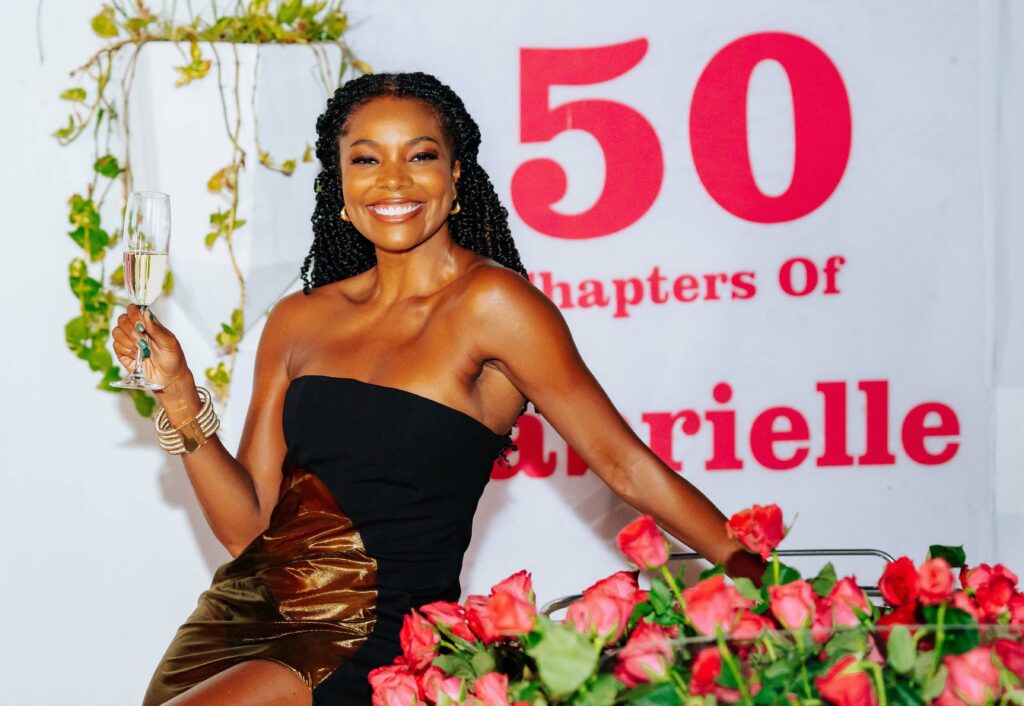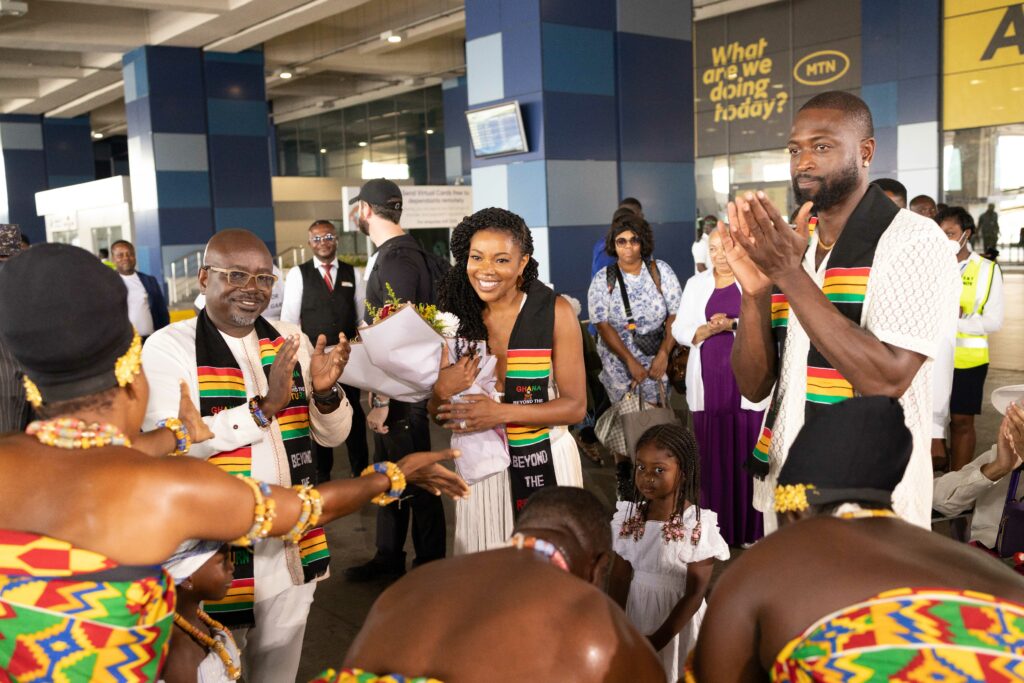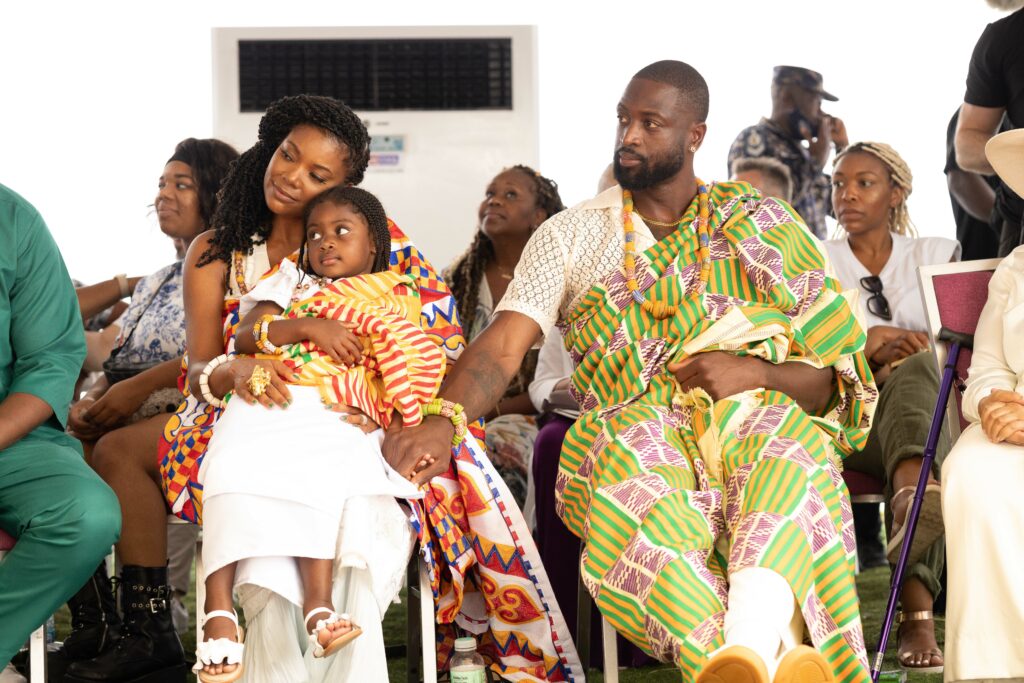Gabrielle Union on Trauma, Healing, and Her “50/50” partnership
By Rebecca Carroll
Let me tell you what Black folks are going to do: survive. And no one knows that better than actress Gabrielle Union, who has spoken very openly about the 30-year battle with PTSD she’s experienced since being raped at gunpoint when she was 19. Union’s trauma came to a head last year while filming the true crime series “Truth Be Told”—and on the eve of her 50th birthday, she decided it was time to lean in to her family and friends for a life-changing, revitalizing experience. That experience became “Gabrielle Union: My Journey to 50,” a two-part BET+ series that follows Union and her family, including her 4-year-old daughter, Kaavia, across four different African countries—a profoundly intimate narrative of discovery that I had the joy of discussing with my friend, Gabrielle Union.
Rebecca Carroll: You experienced a breaking point while you were filming “Truth Be Told”—it re-triggered your trauma. How did that happen?
Gabrielle Union: We were filming a story about the sexual brutality of Black and brown teenage girls in the Bay Area—I don’t think it’s a spoiler alert at this point—and the courthouse where my character is shot is the same courthouse I testified in for the grand jury [for my rape]. And it was like every episode broke something in me, and revealed shit. Everything became crystal clear over the five months of filming, and by the time [my character] dies, I died. I was not myself. I was not well by any stretch of the imagination…When you are empty, trauma takes hold, it takes root, and that becomes the center. It becomes your nucleus.
I’m not a crier, but every day I would walk in—it still makes me emotional now—I would walk into my husband’s side of our room, and he would just be there with his hands out, and I would just sob for 19-year old me, and what I had actually survived. And even when I would tell the story [over the years since], it was telling it from a place of disassociation. I was completely separate from it.
Are you able to give yourself the grace for that disassociation?
Yes. It was necessary to make it. You know what I mean? No hyperbole, no cap. I would not have made it. It’s too much. It was breaking me at 49. I can’t imagine at 19.

In your new BET+ series, there is this palpable sense of rebirth, liberation, and renewal. But because I know you, I know that this is not the first time you have experienced these feelings—how does this particular milestone feel different, and what made you want to capture it on film?
I was so depleted emotionally, and by the time I was getting on the plane [to Africa], I was just dust. I didn’t even have large enough pieces [of myself] to fake it at that point. But I knew I would get my bearings the second we landed, because that has always been true to me. I had been there before, but I used to have no idea what to expect. Each country was new. But as the trips started stacking up, I was like, “Boy, every time I set foot on the continent, my shoulders unclench, I feel seen and acknowledged as a whole person, and I can get back to myself.” It’s different being somewhere where you are acknowledged as a human being, and not necessarily extraordinary or deficient. It’s nice not having to feel like you always have to flex. I could just exist as one of millions who look like me, and it allowed me the time and the space and the grace to look even further to what I didn’t even know existed.

At one particularly emotional point in the series, Dwyane [Wade, Union’s husband] is talking about how you are evolving together in real time, which made me think a little bit differently about this silly dust-up a few weeks back, when you shared in an interview that you two split the household bills 50/50. People on social media couldn’t believe that you were paying half when your husband is an NBA star with a multi-million-dollar net worth. But what I saw in this series is that you two truly are 50/50—not just financially, but in all ways.
Yeah. That’s my potna and my partner.
I know that’s right. The other thing, though, is the scarcity mindset that I think a lot of Black folks experience—if you don’t come up with money or financial security, the anxiety of not having it never goes away, no matter how much you make as an adult.
We come from a people where it’s like, you are your brother’s keeper. You are everybody’s keeper. And if you have it, then we have it. And I subscribe to it. I am an active participant in that. I have three separate households that I’m a hundred percent responsible for. D has even more. There is exactly one person in each of our lives who has ever met the other halfway, and that is each other.
That is amazingly powerful.
And the most loving, joyous thing! I like working, I like contributing. I like going half on a dream home, because it’s our dream. I like going half on our baby, because that was our dream. I’m not chasing him around for 50 cents if he buys some Doritos. It’s not like that. I certainly used all his points and miles to pay for this Africa trip, I will gleefully say that. But knowing what it feels like to be met halfway, and how good and reassuring and how protective that feels—it’s also a lot easier to go into a 50/50 situation knowing somebody can easily pay for a hundred percent.
And he knows that as well. Now, is my money long? No, but can I hold us down. Are we losing this house or are our kids going to be pulled out of private school? No, I got it. Because that’s how I’ve lived my life. I have it. I will have it. I’ll find it, and we’ll be okay. So it’s easier to get into a 50/50 situation knowing that if push comes to shove, nobody’s totally fucked. If it’s different in your house? You like it, I love it. I’m not saying that this is what’s great for everyone. But I’m definitely not stupid or deficient because I like to pay for half of my life and the children that I have created.

Speaking of family—you’ve always emphasized family and friends, many of whom joined you on this journey to Africa. Why is that so important to you?
I come from both sides of big families. And my family don’t play about each other. We just don’t. We call ourselves the dozens of cousins for a reason. If I need to fight, say the word. Nothing brought [my parents] more joy than delivering for their family. And I grew up seeing that. Nothing makes me happier than providing for my family and my community, and I wouldn’t have been able to say that 20 years ago.
Even though you were gaining enough financial stability of your own to help them?
Even though I was giving financially, I didn’t feel worthy of the position. I felt like I was unseen and unloved in my industry. And it took me probably until 40 to really revel in it, and to be outspoken about this joy and how hard fought it was, because before that I still [thought], “If the God of white supremacy and the white gaze don’t see me, then nobody can.”
[But] nobody ever let me fall—not in my industry family, not in my personal family. I tell the story about Regina King literally saving me from the riptide. That’s true as fuck. I talk about Tisha Campbell paying for therapy—I’m still seeing [that therapist] to this day, 25 years later. I’ve just been very lucky that people were not interested in watching me fail. And I’m not interested in watching me fail. And now I feel worthy.
When you were in Ghana, you visited the Last Bath river, where enslaved people were bathed before being loaded onto slave ships for America. It was intense; tell me about it.
As I said [in the series] when I came out of that river, “Oh, this is my superhero origin story.” Right. Holy shit, I am unstoppable. And I fucking believe. Holy fuck. Oh, it’s on. It is on like Donkey Kong, and I can’t fucking wait. I wish a motherfucker would, because I’m ready.
You said earlier that all of this started because you had arrived at a place of feeling depleted—how do you feel now?
Whole. There’s still some cavernous spaces that can be filled, but I want to try to leave myself open to what’s to come and what I don’t know—which is a lot. We know as African-Americans what happened on the other side of the Middle Passage, but we are less secure in our knowledge of who was left behind and what our collective mass absence did for generations. It left a gaping, festering wound all across the diaspora. And we just aren’t as familiar with that.
It’s always amazing to talk to you, Gab.
I live for our talks, and I thank you, because I needed something different today. I’ve been doing [interviews] all day, but this is the first real one, so I appreciate you.
Right back at you.